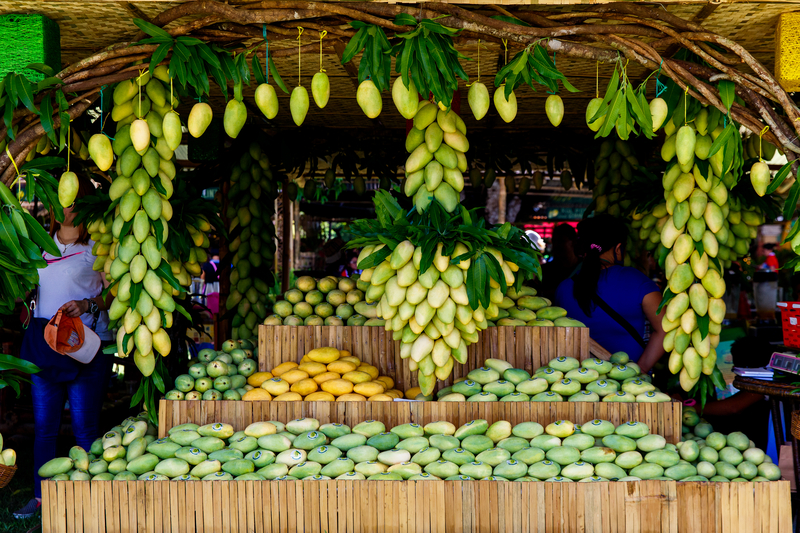
THE Intellectual Property Office of the Philippines (IPOPHL) said it recently approved Guimaras mangoes as the Philippines’s first geographical indication (GI).
In a statement on Thursday, IPOPHL said the Guimaras Mango farmers have worked for about a decade for the “coveted” seal.
Guimaras Mango Growers and Producers Development Cooperative (GMGPDC) President Felipe Z. Gamarcha revealed the economic benefits the
group expects to gain from the GI approval.
He said, “Ngayon, kapag nakatatak na ‘yung GI, [sana] almost double na from the local price. [Now with the GI seal, we hope local prices will double]. So additional income [for] farmers,” Gamarcha said.
Gamarcha was referring to the farm gate price of Guimaras Mangoes which averaged P200 in 2022. This, IPOPHL said, “already marks an astronomical rise from the P20 to P50 that one kilo would usually fetch before the association secured a collective mark in 2017.”
According to IPOPHL, a GI serves as a marketing tool that “accentuates” a products’ distinctiveness and appealing narratives.
It also noted that a GI seal certifies a link between the quality, characteristics and reputation of a product and its geographical source. These factors, IPOPHL noted, may have been shaped due to environmental influences, such as soil and climate, or human factors, such as tradition and local know-how.
For her part, IPOPHL Deputy Director General Ann Claire C. Cabochan highlighted the “great potential” of GI “not only in spreading development outside our bustling metropolitan areas, but also in ensuring that the people of the originating locality benefit from their produce.”
After applying in November 2022, the GMGPDC’s application was approved by IPOPHL on May 13,2023 after passing the Bureau of Trademarks’ (BOT) thorough examination process, IPOPHL noted.
During the month-long publication period that followed to allow for third-party protests, IPOPHL said the association did not face any concerns of possible damage to an existing trademark.
Guimaras Mangoes are produced across the entire island province of Guimaras which is comprised of five municipalities— Jordan, Buenavista, San Lorenzo, Sibunag and Nueva Valencia.
IPOPHL said while it may have taken the association less than a year to secure protection, the first steps toward GI trace back to 2013 when it first worked with the European Union under the Trade-Related Technical Assistance Project and consulted with IPOPHL.
Former Provincial Economic Development Officer Elena V. Quezon recalled the “extensive” meetings that took place before members could reach consensus over a single characteristic of the product.
She said many were negotiating for production processes and requirements that were “achievable” but still preserved the premium qualities that characterize the Guimaras Mangoes.
“For our co-participants here who will be applying for the GI, don’t be discouraged because we have this journey but now we are enjoying the gains we have,” Quezon said.
She said the association is already getting offers to export to the Czech Republic, Dubai and Republic of Korea after making its first export to Switzerland of an initial two tons in 2022.
Quezon, however, cited infringement as one “major challenge” that needs to be resolved following the GI registration.
IPOPHL said Quezon hopes for stronger safeguards to prevent deceptive traders from falsely claiming their products as Guimaras mangoes when they did not meet approved standards.
Meanwhile, to combat counterfeiting, BOT Director Jesus Antonio Z. Ros acknowledged the importance of establishing a strong GI regime through a Sui generis law.
“In our proposed legislation, we make violation of GI a crime against the economic and cultural interests of the State, which means it can be enforced by the latter without private stakeholders initiating the process,” Ros said.
“Hopefully, our legislators will support our initiative,” Ros said.
According to IPOPHL, the envisioned bill will be in line with IPOPHL’s plans to bring the Philippines to accede to the 2015 Geneva Act of the Lisbon Agreement.
The Geneva Act provides a streamlined international registration route for GIs, facilitating potential market expansion in over 70 contracting member countries.
“The pursuit of this international registration framework highlights the Philippines’ commitment to protecting its unique products and promoting them on a global scale,” Director General Rowel S. Barba said.
Under the Geneva Act, GIs also enjoy an indefinite duration of protection as long as the main geographically attributed qualities are preserved. Hence, unlike with the collective and certification mark systems, which require renewal after 10 years, GIs registered under the Geneva Act won’t need renewal, saving on both time and costs.
Image credits: Elena Frolova | Dreamstime.com
